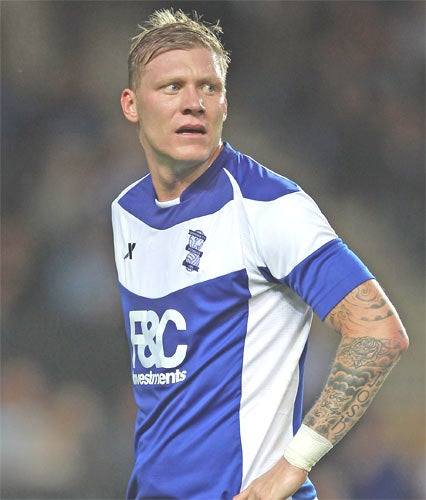Barnsley failed to do their homework on O'Connor's drug ban

Your support helps us to tell the story
From reproductive rights to climate change to Big Tech, The Independent is on the ground when the story is developing. Whether it's investigating the financials of Elon Musk's pro-Trump PAC or producing our latest documentary, 'The A Word', which shines a light on the American women fighting for reproductive rights, we know how important it is to parse out the facts from the messaging.
At such a critical moment in US history, we need reporters on the ground. Your donation allows us to keep sending journalists to speak to both sides of the story.
The Independent is trusted by Americans across the entire political spectrum. And unlike many other quality news outlets, we choose not to lock Americans out of our reporting and analysis with paywalls. We believe quality journalism should be available to everyone, paid for by those who can afford it.
Your support makes all the difference.Garry O'Connor was not asked by Barnsley about his secret cocaine ban, it emerged yesterday. The Scottish striker was twice loaned to Barnsley from Birmingham last season, before signing permanently at Oakwell. Barnsley director Rod Dowling said on Channel 4's Dispatches on Monday that he did not know about O'Connor's two-month cocaine-ban from 2009, and that had he known Barnsley would not have signed him. But a simple administrative procedure, common to many clubs, would have revealed O'Connor's past had it been followed.
Clubs interested in the drugs history of their new players can easily find out. Clubs ask players to sign a form permitting them to access the relevant FA doping control records. Had Barnsley done so, O'Connor's two-month ban would have been revealed. When asked yesterday whether they had done this, a Barnsley spokesman said he had "no idea".
Barnsley could also have asked Birmingham City, from whom they loaned O'Connor but did not do so. Medical disclosures accompanying transfers are a matter not for the governing bodies but for the clubs involved. Had Barnsley asked Birmingham they would have had little option but to reveal the ban after O'Connor's positive test on 19 October 2009.
O'Connor's ban was only publicly revealed by Dispatches on Monday evening. Until then it had been secret, in keeping with the FA's confidentiality rule on non-matchday positive tests for recreational drugs. This rule allows players to seek treatment, and sources familiar with O'Connor's troubles said yesterday that he continues to seek assistance for his personal problems.
Dowling had said on Dispatches that they had "no knowledge" from Birmingham City or elsewhere of O'Connor's secret ban, and that had they known they would not have signed him, out of a concern to "project the right image". O'Connor played 23 games for Barnsley last season. His appearances were spread across two separate autumn loan moves, and a permanent deal signed in December.
O'Connor rejoined his first club Hibernian this summer, for whom he has already scored four goals this season. He appeared at Edinburgh Sheriff Court this month, accused of possessing cocaine.
Join our commenting forum
Join thought-provoking conversations, follow other Independent readers and see their replies
Comments